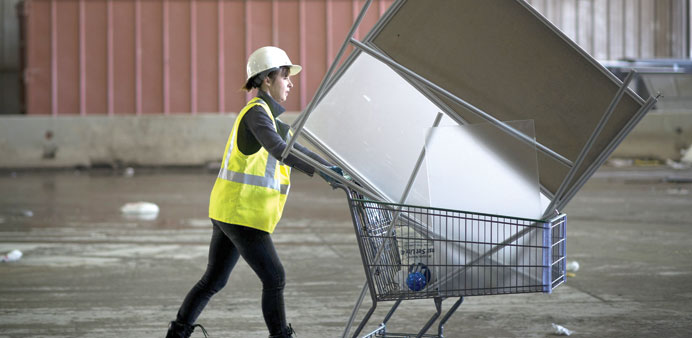Recology Artist in Residences Yulia Pinkusevich at a San Francisco city dump scavenging for materials to create their art.
By Katherine Seligman
Yulia Pinkusevich excavated a pile of broken wood, discarded windows, squashed toys and other urban flotsam at the public dump one afternoon until she uncovered a plastic board dotted with holes.
“This is kind of cool, but I don’t know what it is,” she said, loading it in a shopping cart. “You really have to dig to find the treasure.”
If there is a place for an artist to find treasure in the trash, it is the public disposal and recycling area operated by Recology, the company that handles trashing, collecting, recycling and composting in San Francisco and more than 100 other communities. The company opens its dump at the southern edge of the city to local artists chosen as part of its Artist in Residence programme.
“The trucks are smashing and destroying, and we’re picking things up,” said Pinkusevich, dressed in a hard hat, yellow safety vest and heavy boots as she scavenged. “You see things other artists would covet.”
Pinkusevich and Stephanie Syjuco, a conceptual multimedia artist, were selected from dozens of applicants, all vying to gather inspiration from what others throw away. Both of the San Francisco-based artists get a stipend, four months of dump access and nearby studio space.
Their work will conclude with an exhibition in January and an opening-night party, complete with sparkling water and finger food, held in a room where the usual decor is a display on recycling.
The unusual programme, founded in 1990 to educate about recycling and conservation, now plans 10 to 15 shows a year in public and private spaces. Recently it held a first-of-its-kind exhibition at San Francisco International Airport and collaborated with artists from Haiti, whose work was on display along with the artists in residence.
“We knew Recology was a dump,” said Romel Jean Pierre, one of the Haitian artists sponsored by Project Hope Art. “But coming here we say, ‘Hey, it’s like a brand-new store.’ There is no trash. There are just brand-new things and no place for them anymore.”
Pinkusevich and Syjuco were overwhelmed as well when they first saw the dump, an expanse of constantly growing debris shovelled by bulldozers into 15ft-high piles. They watched a set of corporate desks, chairs, two unopened boxes of backpacks and perfectly good shelving thrown from the back of trucks. One man opened his van and unloaded what he said was 50 years of his parents’ lives.
Recology workers separate electronics, books, furniture and other items that can be donated or reused, said Deborah Munk, the programme’s director. The rest is loaded onto conveyer belts and sorted. Only about 20% ends up in the landfill.
“One of the beauties of this residency is that you are pushing a shopping cart, which is a metaphor for shopping, but you’re doing it in this end-stream situation,” said Syjuco, much of whose work concerns the ramifications of capitalism.
Born in the Philippines, Syjuco said she came to the programme with the notion of creating an “alternative vending structure to showcase” the things she finds. She also wanted to collect cultural objects and speculate on why they were discarded.
By the end of the first week she had carted away a selection of Disney toys, a mirror and a long string of lights.
“Right now it’s just hoarding,” Syjuco said, standing in her studio. “It’s hard to tell what will happen.”
Pinkusevich, who was born in what is now Ukraine and teaches drawing at Stanford University, works with reused materials. Last year, she completed a project based on recycled plastic trash.
“I was mentally prepared for this,” she said, “but when the bulldozer comes in and smashes things and they’re gone, that’s the part that gets to me emotionally.”
Like the hungry seagulls circling overhead, Pinkusevich and Syjuco waited as each new truck dumped its contents. In the pile: a painted child’s desk, a bike, bags of stale rolls, a giant cardboard sunflower, a ‘Popular Science’ magazine from the 1960s.
“You never know what someone else would like,” said John Monteverde, a woodworker from San Francisco, as he finished unloading debris, then drove off to make room for the next truck. — The Sacramento Bee/MCT

